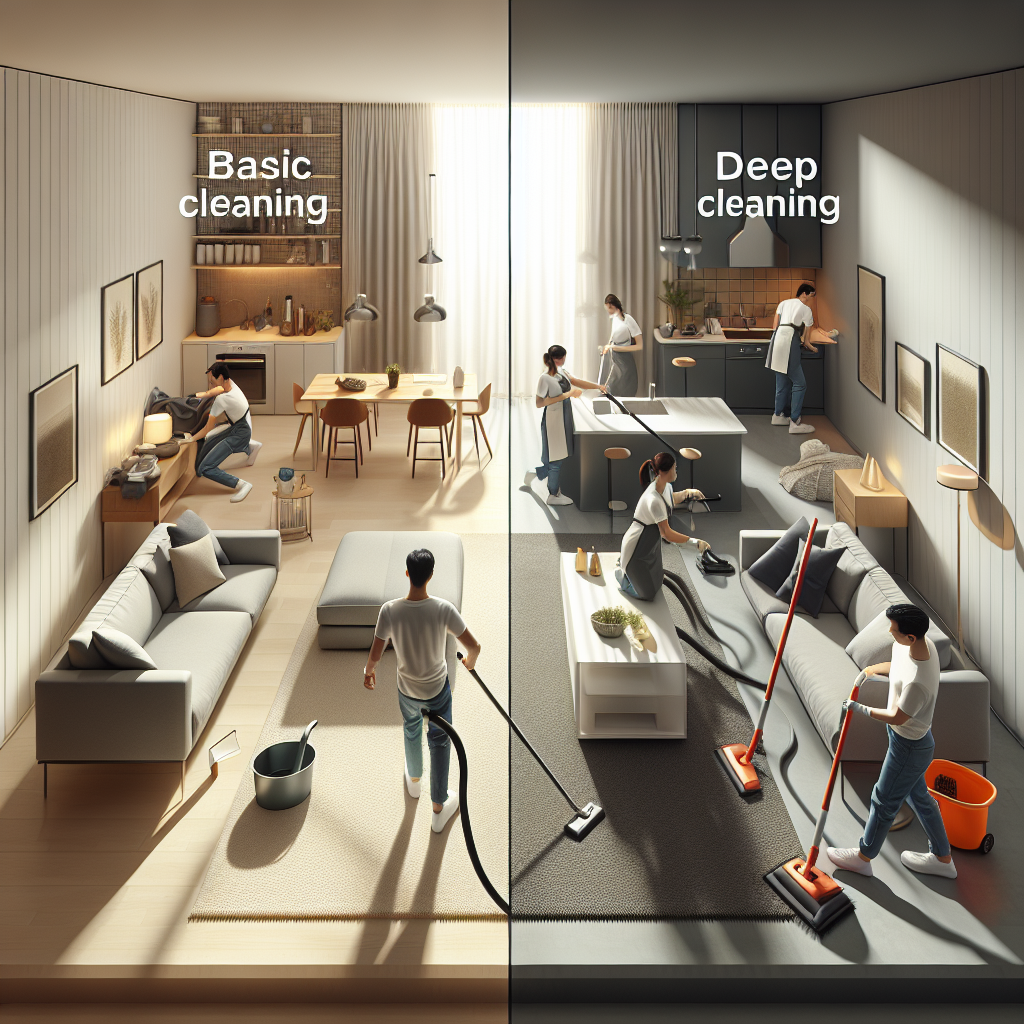- August 2, 2024
- Derek
Basic vs Deep Cleaning Whats the Difference
When it comes to maintaining a clean and healthy living environment, understanding the difference between basic and deep cleaning is essential. Both types of cleaning play a crucial role in ensuring that your home or office remains pristine, but they serve different purposes and are suitable for different situations. In this comprehensive guide, we will delve into the nuances that distinguish basic cleaning from deep cleaning, helping you make informed decisions about which service is right for you.
Basic cleaning typically involves routine tasks that are performed on a regular basis to maintain a certain level of cleanliness. These tasks include dusting, vacuuming, mopping, and wiping down surfaces. Basic cleaning is often sufficient for day-to-day upkeep and helps in preventing the buildup of dirt and grime.
On the other hand, deep cleaning is a more thorough and intensive process that targets hidden dirt, grime, and allergens that are not addressed during regular cleaning sessions. This type of cleaning involves scrubbing and disinfecting areas that are often overlooked, such as behind appliances, inside ovens, and deep within carpets. Deep cleaning is usually recommended on a less frequent basis, such as quarterly or bi-annually, to ensure a truly clean and healthy environment.
Whether you are preparing for a special event, moving into a new home, or simply want to give your space a fresh start, understanding the difference between basic and deep cleaning will help you achieve the best results. Visit our website to learn more and get your FREE Quote today! Click here.
What is Basic Cleaning

Basic cleaning refers to the routine cleaning tasks that help maintain a tidy and hygienic environment. These tasks are usually performed on a regular basis—such as daily, weekly, or bi-weekly—to keep your living or working space in good condition. The primary focus of basic cleaning is to address visible dirt and maintain a level of cleanliness that prevents the buildup of dust, grime, and clutter.
Some of the common tasks involved in basic cleaning include:
- Dusting: Removing dust from surfaces like countertops, shelves, and furniture to keep them clean and free of allergens.
- Vacuuming: Cleaning carpets, rugs, and floors to remove dirt, debris, and pet hair. Regular vacuuming helps in maintaining the appearance and longevity of your flooring.
- Mopping: Wiping hard floors with a damp mop to remove any spills, stains, and dirt that vacuuming might miss.
- Surface Cleaning: Wiping down and disinfecting high-touch areas such as kitchen counters, bathroom sinks, and doorknobs to reduce the spread of germs.
- Trash Removal: Emptying waste bins and disposing of garbage to keep your space fresh and odor-free.
Basic cleaning is essential for keeping your environment comfortable and presentable on a daily basis. While it may not address hidden dirt or deep-seated grime, it ensures that your space remains welcoming and manageable for everyday life. By adhering to a regular basic cleaning schedule, you can prevent the accumulation of dirt and make more intensive cleaning tasks easier to handle when the time comes.
What is Deep Cleaning

Deep cleaning goes beyond the surface to tackle the hidden, ingrained dirt and grime that accumulates over time. Unlike basic cleaning, which focuses on maintaining day-to-day cleanliness, deep cleaning involves a more thorough and detailed approach to ensure every nook and cranny of your space is addressed. This type of cleaning is typically performed less frequently—often on a quarterly or bi-annual basis—but it is crucial for maintaining a truly hygienic and healthy environment.
Some of the tasks involved in deep cleaning include:
- Detailed Dusting: Cleaning hard-to-reach areas such as ceiling fans, light fixtures, and vents, as well as dusting behind and under furniture.
- Intensive Floor Care: Shampooing carpets and rugs, scrubbing grout lines in tile floors, and applying polish to hardwood floors to restore their shine.
- Thorough Kitchen Cleaning: Cleaning inside appliances like ovens, microwaves, and refrigerators, as well as degreasing stovetops, range hoods, and backsplash areas.
- Bathroom Sanitization: Scrubbing tiles, grout, and toilet bases, cleaning showerheads and faucets, and removing soap scum and hard water stains from glass and fixtures.
- Window and Blind Cleaning: Washing windows inside and out, and dusting or washing blinds and curtains to remove accumulated dust and dirt.
Deep cleaning is essential for maintaining the overall health and longevity of your living or working space. By addressing areas that are often overlooked during basic cleaning, deep cleaning helps to eliminate allergens, bacteria, and mold, contributing to a healthier indoor environment. Whether you’re preparing for a special event, moving in or out of a property, or just aiming for a spotless home, deep cleaning provides a level of detail and care that basic cleaning simply cannot achieve.
Key Differences Between Basic and Deep Cleaning

Understanding the key differences between basic and deep cleaning is essential for choosing the right service to meet your needs. While both types of cleaning aim to maintain cleanliness and order, they differ significantly in scope, frequency, and level of detail.
Scope of Work: Basic cleaning typically involves routine tasks such as dusting surfaces, vacuuming floors, wiping down countertops, and cleaning bathrooms. These tasks are designed to keep your living or working space looking tidy and presentable on a regular basis. In contrast, deep cleaning goes much further. It includes all the tasks of basic cleaning but also tackles areas that are often neglected, such as cleaning behind appliances, scrubbing tile grout, and washing windows.
Frequency: Basic cleaning is often performed on a regular schedule, such as weekly or bi-weekly, to maintain a consistent level of cleanliness. Deep cleaning, however, is usually done less frequently—often on a quarterly or bi-annual basis. This is because deep cleaning is more comprehensive and time-consuming, making it impractical for frequent execution.
Level of Detail: The level of detail is another major difference between the two. Basic cleaning focuses on surface-level tasks to keep your environment looking neat. On the other hand, deep cleaning is highly detailed, addressing hidden dirt and grime that accumulates over time. It involves more intensive tasks such as scrubbing baseboards, cleaning inside appliances, and disinfecting high-touch areas to ensure a thorough clean.
By understanding these differences, you can better decide when to opt for basic cleaning and when a deep cleaning is necessary. Whether you’re looking to maintain daily cleanliness or need a more thorough cleaning to address built-up dirt and grime, knowing the distinctions between these services will help you achieve the desired level of cleanliness for your space.
Benefits of Basic and Deep Cleaning

Both basic and deep cleaning offer distinct benefits that contribute to a healthier, more inviting living or working environment. Understanding these advantages can help you determine which type of cleaning is best suited to your needs at any given time.
Benefits of Basic Cleaning:
- Maintains Appearance: Regular basic cleaning helps keep your home or office looking neat and presentable, making it a more pleasant place to live or work.
- Prevents Clutter: By consistently addressing surface-level dirt and mess, basic cleaning prevents clutter from accumulating, making it easier to find and access items.
- Improves Air Quality: Routine dusting and vacuuming remove dust, allergens, and other airborne particles, which can significantly improve indoor air quality and reduce allergy symptoms.
- Saves Time: Regular maintenance through basic cleaning saves you time in the long run by preventing the build-up of dirt and grime, making deeper cleaning sessions less frequent and extensive.
Benefits of Deep Cleaning:
- Enhanced Cleanliness: Deep cleaning provides a more thorough clean, reaching areas that are often overlooked, such as under furniture, behind appliances, and inside cabinets. This ensures a more comprehensive removal of dirt and grime.
- Healthier Environment: By thoroughly disinfecting surfaces and addressing hidden dirt, deep cleaning significantly reduces the presence of bacteria, viruses, and other pathogens, contributing to a healthier living or working space.
- Prolongs Lifespan of Surfaces: Regular deep cleaning can extend the life of your flooring, countertops, and other surfaces by removing abrasive dirt and grime that can cause wear and tear over time.
- Improves Aesthetics: A deep clean can rejuvenate the appearance of your space, making it look fresher and more inviting. This is particularly beneficial when preparing for special occasions or when moving in or out of a property.
By leveraging the benefits of both basic and deep cleaning, you can maintain a consistently clean and healthy environment while also ensuring that your space receives the occasional in-depth attention it needs to remain in top condition. Whether you prefer regular upkeep or periodic thorough cleanings, both approaches play a crucial role in preserving the cleanliness and appeal of your living or working space.
When to Choose Basic or Deep Cleaning

Deciding between basic and deep cleaning depends largely on your specific needs, circumstances, and the condition of your space. Here are some guidelines to help you choose the right type of cleaning for different situations:
When to Choose Basic Cleaning:
- Regular Maintenance: If your home or office is generally tidy and you’re looking to maintain its cleanliness, basic cleaning is ideal. It covers surface-level tasks such as dusting, vacuuming, and wiping down surfaces to keep your space looking neat and orderly.
- Busy Lifestyles: For those with hectic schedules, basic cleaning helps manage day-to-day messes without taking up too much time. It ensures that your environment remains clean and presentable between more thorough cleaning sessions.
- Frequent Visitors: If you often have guests over, basic cleaning can help you keep your home in a state that is always ready to welcome visitors.
When to Choose Deep Cleaning:
- Seasonal Cleaning: Deep cleaning is perfect for seasonal changes, such as spring cleaning or preparing your home for the holidays. It addresses areas that don’t often get attention during regular cleanings.
- After Renovations: Post-renovation cleanups require a deep cleaning to remove construction dust, debris, and any other residue left behind, ensuring that your new space is truly ready to enjoy.
- Health Concerns: If you or a family member suffers from allergies or respiratory issues, deep cleaning can help eliminate allergens and improve indoor air quality.
- Moving In or Out: Whether you’re moving into a new home or preparing to leave your current one, deep cleaning ensures that the space is spotless, either for you to settle into or to leave in pristine condition for the next occupants.
- Special Occasions: Hosting a major event or celebration at your home? Deep cleaning ensures that every corner of your space is immaculate, making a lasting impression on your guests.
Incorporating both basic and deep cleaning into your routine can help you maintain a consistently clean and healthy environment. By assessing your specific needs and circumstances, you can choose the right type of cleaning to keep your space looking its best.
Visit our website to learn more and get your FREE Quote today! Click here.
